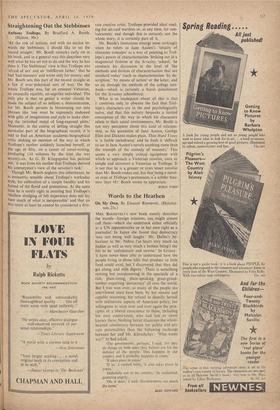Straightening Out the Stebbinses
'AT the risk of tedium, and with no malice to- wards the Stebbinses, I should like to set the record straight,' MT. Booth remarks early on in his book, and in a general way this describes very well what he has set out to do and the way he has done it. The Stebbinses' view is that Trollope was. 'afraid of sex' and an 'indifferent father,' that he had 'bad manners' and wrote only for money; and Mr. Booth sets this part of the record straight in a fair if over-polemical sort of way. On the whole Trollope was, for an eminent Victorian, an unusually equable, un-sagelike individual. The only pity is that so genial a writer should be made the subject of so tedious •a demonstration, for Mr. Booth persists in blossoming out into Phrases like 'one must be supremely endowed with gifts of imagination and \style to make shin- ing the tarnished metal of long-exposed plots.' Moreover, in the course of setting straight this particular part of the biographical record, it is odd to find an American academic-biographical critic making no mention of the way in which Trollope's mother suddenly launched herself, at the age of fifty, on a career of novel-writing, producing 114 volumes by the time she was seventy-six. As G. D. Klingopulos has pointed out, 'it was from his mother that Trollope derived his journeyman's view of the novelist's task:' Though Mr. Booth neglects this inheritance, he Is eminently sensible about Trollope's workaday style, his cultivation of a simple lucidity and his hatred of the florid and pretentious. At the same time he is surely right in insisting that Trollope's `shallow dredging of felt experience does not lay bare much, of what is inexpressible' and that on this score at least he cannot be considered a first-
rate creative artist. Trollope provided ideal read- ing for air-raid wardens or, at any time, for con- valescents; and though this is certainly not the whole story, it is certainly part of it.
Mr. Booth's limitations emerge most strikingly when he refers to Jane Austen's 'totality of character concepts' as a way of pointing to Trol- lope's power of characterisation. Striking out in a magisterial fashion at the Scrutiny. 'school,' he conducts his discussion at the level of 'the methods and devices of characterisation that are standard today' (such as characterisation 'by de- scription,"by means of action' or the letter, and so on through the methods of the college text- book—which is certainly a harsh punishment for the Scrutiny schoolboys).
What is so inadequate about all this is that it contrives only to obscure the fact that Trol- lope's characters are in the end psychologically naive, and that this naivety bespeaks a limited conception of the way in which his characters relate to their social environments. Mr. Booth is not very percipient about this kind of relation- ship, as his quotation of Jane' Austen, -George Eliot and Dickens makes plain. Thus Hard Times is 'a feeble melodrama' and he finds it 'difficult to see in Jane Austen's novels anything more than the triumph of the comedy of manners.' This seems a very simple critical equipment with which to approach a Victorian novelist, even so simple and extrovert a Victorian as Trollope. It is not that he is a. greater or even lesser novelist than Mr. Booth makes out, but that being a novel-
ist even of Tr . ollope's pretensions a subtler busi ness than Mr. Booth seems to appreciate.
BORIS FORD














































 Previous page
Previous page